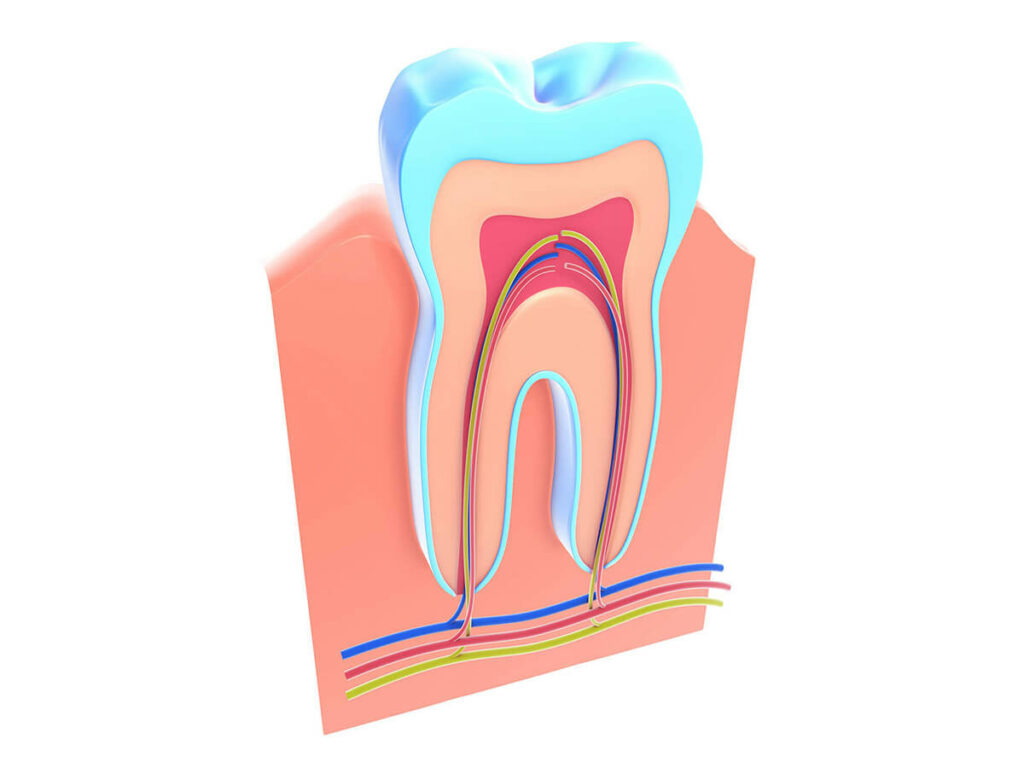Root Canal Treatment
Root canal treatment cleans out the infection deep inside your tooth, preserving it while alleviating severe pain and preventing the need for more extensive dental procedures. Our root canal dentists are dedicated to saving infected teeth with expert care, ensuring your mouth stays healthy and strong.
Root Canal Treatment
A root canal treatment, or endodontic therapy, can save a tooth when the innermost layer, the pulp, becomes infected or damaged due to decay, cracks, or trauma. Symptoms such as severe toothache, sensitivity, swelling, and gum tenderness indicate the need for prompt attention to prevent complications. During a root canal, a dentist drills a small hole in the tooth’s crown, removes the infected pulp, cleans and disinfects the inside of the tooth, then fills and seals it to prevent future infections.
Modern techniques and anesthesia make the procedure relatively straightforward and often painless. Opting for a root canal can alleviate pain, preserve your natural tooth, and restore oral health, ensuring your smile remains intact. If you suspect an infection, consult your dentist to determine the best treatment plan for you. The need for a root canal treatment arises when the pulp inside a tooth becomes infected or severely decayed. This can be caused by deep cavities, cracks or fractures in the tooth, repeated dental procedures on the same tooth, or trauma to the tooth.
Symptoms such as persistent pain, prolonged sensitivity to hot or cold, swelling, and tenderness in the surrounding gums often indicate the necessity for this procedure.
Anyone experiencing severe tooth pain, sensitivity to temperature, or signs of infection might need a root canal to prevent tooth loss.
If you have a painful, damaged, or infected tooth, book a consultation appointment below so we can determine the best treatment for you and get you pain-free as quickly as possible.
Root Canal Treatment Aftercare
-
How is a root canal performed?
The Procedure at Collins Dental
At Collins Dental in Winter Springs, FL, a root canal procedure is conducted with a focus on patient comfort and effective treatment. Here’s what you can expect during the process:
- Initial Consultation: Your dentist will first conduct a thorough examination, which may include X-rays, to determine the extent of the infection or damage to the tooth’s pulp.
- Preparation and Anesthesia: To ensure a pain-free experience, local anesthesia will be administered to numb the affected area. The team at Collins Dental prioritizes patient comfort and will make sure you are completely numb before proceeding.
- Accessing the Pulp: Once the area is numb, the dentist will create a small opening in the crown of the tooth to access the infected or damaged pulp inside.
- Removing the Infected Pulp: Using specialized instruments, the dentist will carefully remove the infected or damaged pulp from the tooth’s root canals. This step helps eliminate any bacteria and prevent further infection.
- Cleaning and Disinfecting: After the pulp is removed, the inside of the tooth will be thoroughly cleaned and disinfected to ensure no bacteria remain.
- Filling the Canals: The cleaned root canals are then filled with a biocompatible material called gutta-percha. This rubber-like material helps seal the canals and prevent future infections.
- Sealing the Tooth: Finally, the tooth’s opening is sealed with a temporary or permanent filling. In some cases, a crown may be recommended to fully restore the tooth’s strength and appearance.
- Post-Procedure Care: The dentist will provide you with care instructions for the days following your procedure. Some mild discomfort is normal, but it can usually be managed with over-the-counter pain relievers.
We’re committed to ensuring a smooth and stress-free experience. We use the latest technology and techniques to make the root canal treatment as effective and comfortable as possible. If you have any questions or concerns, we are more than happy to address them and guide you through each step of the process.
-
How do I know if my root canal is infected?
Recognizing an infected root canal involves being aware of several key symptoms. Here are some common signs:
- Persistent Pain: Ongoing pain or discomfort in the affected tooth, which may be sharp, throbbing, or constant.
- Swelling and Tenderness: Swelling around the tooth or in the gums, which may be tender to touch.
- Sensitivity: Prolonged sensitivity to hot or cold temperatures, even after the stimulus is removed.
- Discoloration: The tooth might appear darker than the surrounding teeth.
- Pus Discharge: A bad taste in your mouth or pus discharge near the affected tooth.
- Fever: A mild to high fever indicating an underlying infection.
- Abscess: A visible pimple-like bump on the gums near the affected tooth could indicate an abscess.
If you experience any of these symptoms, it’s important to contact your dentist as soon as possible for an evaluation and appropriate treatment. Early intervention can prevent further complications and ensure the best outcome for your dental health.
-
Are root canal infections serious?
Root canal infections can be serious if left untreated. An infection in the tooth’s pulp can spread to surrounding tissues, leading to complications such as abscess formation, bone loss around the tip of the root, and systemic issues like fever and swelling. In severe cases, the infection can spread to other parts of the body, posing significant health risks. Timely intervention through a root canal treatment is crucial to remove the infection, alleviate pain, and prevent further complications. If you suspect a root canal infection, seeking prompt dental care is essential to protect your overall health and well-being.
-
How long does the pain from a root canal treatment last?
The good news is that modern advancements in dental techniques and anesthesia have made root canal treatments much more comfortable than they were in the past. Most patients report feeling little to no pain during the procedure itself, thanks to the use of local anesthesia, which numbs the affected area.
While it’s normal to experience some discomfort or mild soreness after the procedure, this can usually be managed effectively with over-the-counter pain relievers and should subside within a few days. The discomfort from a root canal is often less severe than the pain caused by an untreated infected tooth.
It’s important to remember that a root canal treatment is designed to relieve the pain caused by infection or damage to the tooth’s pulp. By addressing the issue promptly, you can avoid more severe complications and ensure a healthier, pain-free smile.
If you have concerns about the procedure, discuss them with your dentist. They can provide detailed information tailored to your situation and help you feel more at ease about the process.
Stop the Pain and Save Your Tooth
Schedule your appointment for a consultation or Root Canal Treatment in Winter Springs, FL. It’s time to alleviate your pain and save your tooth.
